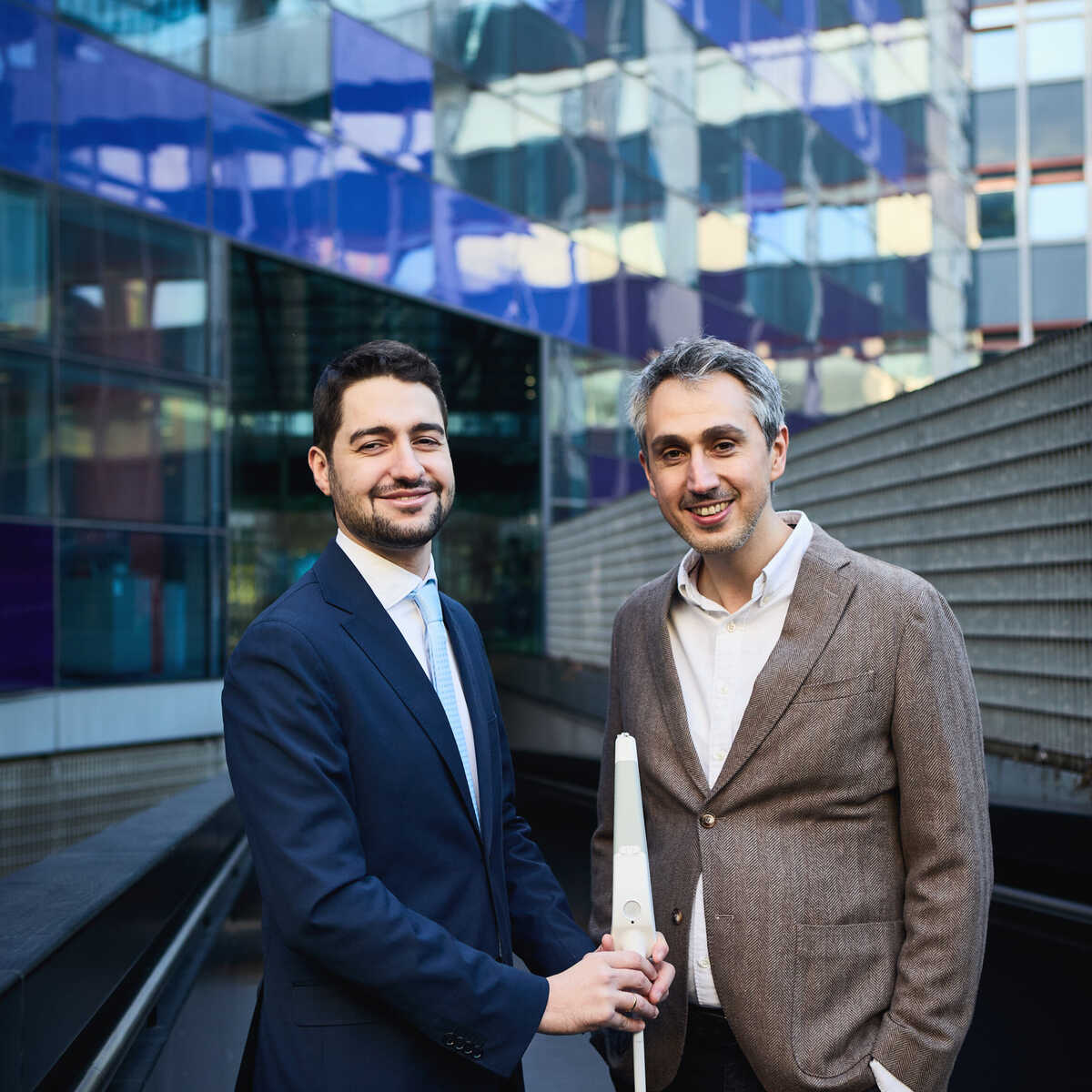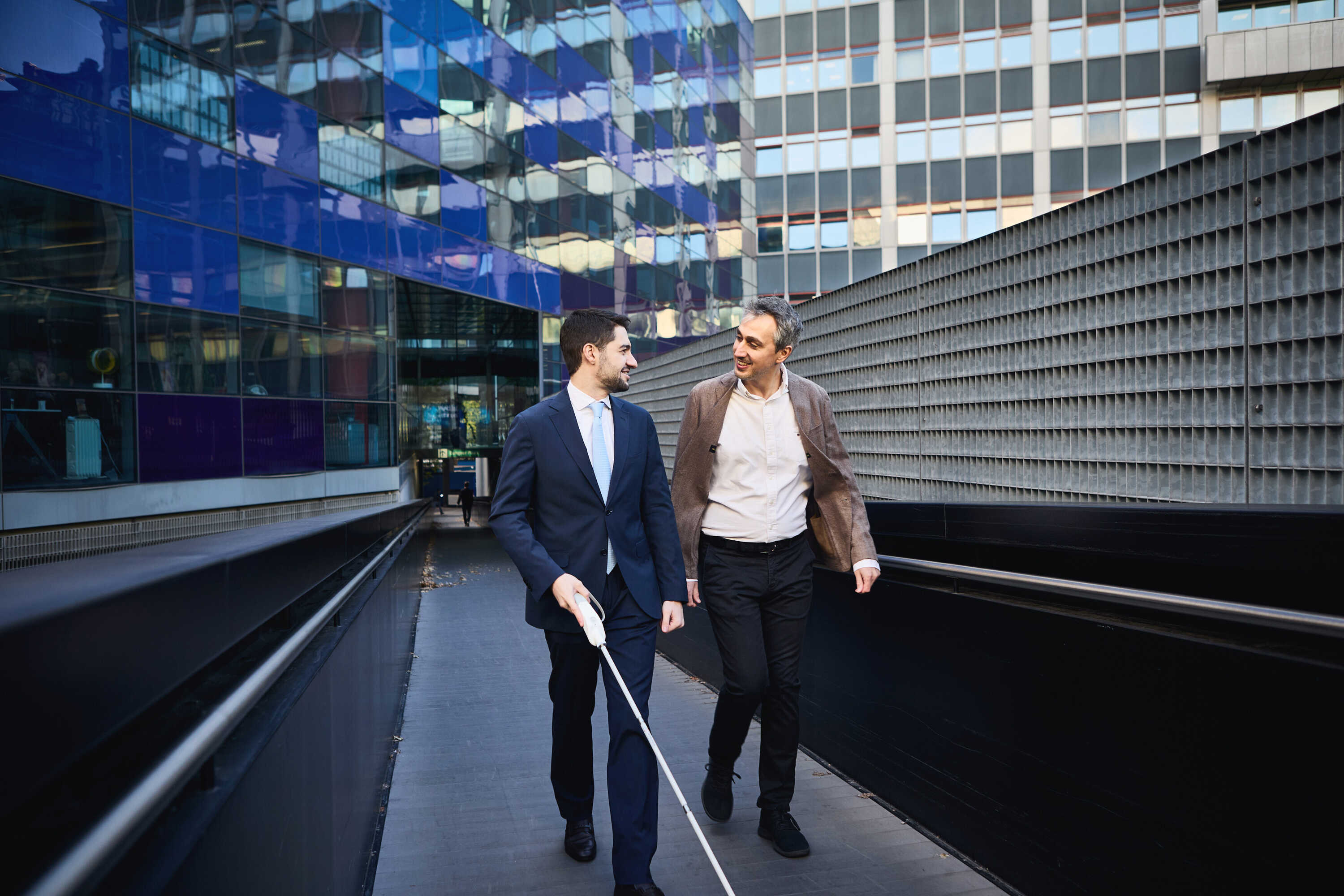A great step forward
WeWalk collaborators Dr Jean Marc Feghali and Gökhan Meriçliler share a vision of a more inclusive world.
Interview: Jo Caird
 TIME Magazine picked it as one of its best inventions of 2019; the prestigious Edison Awards gave it a Gold Medal; and Amazon named it Startup of the Year two years later. But for all the accolades, WeWalk collaborators Dr Jean Marc Feghali (MEng Civil Engineering 2018; PhD 2022) and Gökhan Meriçliler (MSc Business Analytics 2022) share one important vision for their groundbreaking smart cane.
TIME Magazine picked it as one of its best inventions of 2019; the prestigious Edison Awards gave it a Gold Medal; and Amazon named it Startup of the Year two years later. But for all the accolades, WeWalk collaborators Dr Jean Marc Feghali (MEng Civil Engineering 2018; PhD 2022) and Gökhan Meriçliler (MSc Business Analytics 2022) share one important vision for their groundbreaking smart cane.
“WeWalk is more than a product,” says Feghali, “it’s a shared vision for a more inclusive world. By blending rigorous research with real-world needs, we have developed a smart cane that helps visually impaired people actively participate in society. Thousands of WeWalk users are telling us that our smart cane has enabled them to live fuller lives.” WeWalk acts as a new handle when attached to any long cane, vibrating to inform users of low-hanging obstacles that the bottom of a cane may typically miss, while also offering up a range of smart navigation features. For Meriçliler, co-founder and CEO, it is the culmination of ten years’ work developing technologies with and for visually impaired people. He was previously at YGA, a tech-driven social innovation NGO based in Istanbul, but when he relocated to England in 2018 to grow the business, he came to the attention of Feghali, visually impaired himself and at the start of a civil engineering PhD addressing the mobility challenges faced by visually impaired people. The pair hit it off right away and the collaboration was born.
Having joined WeWalk as Head of Research and Development, Feghali approached his supervisor, Professor Washington Yotto Ochieng, Head of the Department of Civil and Environmental Engineering, about bringing WeWalk into his PhD. With Imperial behind them, it was time for take-off. “With Professor Ochieng in our corner, we applied for Innovate UK grants, built and tested indoor navigation systems at Imperial, and are still collaborating to this day,” says Feghali.
 That collaboration has also opened the door to other successful partnerships – with the Royal National Institute of Blind People, for instance, which extensively tests, iterates and validates WeWalk’s products; and with Microsoft, which supports the company’s Artificial Intelligence Mobility platform.
That collaboration has also opened the door to other successful partnerships – with the Royal National Institute of Blind People, for instance, which extensively tests, iterates and validates WeWalk’s products; and with Microsoft, which supports the company’s Artificial Intelligence Mobility platform.
“The smart cane is a very important step forward for the visually impaired community – the white cane is a universal tool, and through our partnership with Microsoft and the mobility app Moovit, people can use it with our navigation app in more than 3,000 cities around the world,” explains Meriçliler. “But we hope to go beyond that, drawing on Imperial’s know-how and deep tech expertise.” The sensing technology being developed for autonomous vehicles, for example, could have applications when it comes to wearable navigation devices for visually impaired people.
“You can truly feel the enthusiasm of Imperial’s PhD students working with our visually impaired participants,” says Feghali, “when they’re taking Imperial’s great theoretical work and transitioning it to something practical.” And securing funding from prominent venture capitalists worldwide, including Nesta, KHP, APY, Vestel and NEC X, “empowered us with the financial strength and confidence to transform our state-of-the-art research to tangible products”, adds Meriçliler.
“We are eager to reach a global community to support our cause,” says Meriçliler. “But we’re also grateful for what this represents – shining a light on tech for good initiatives – because impact-driven businesses will be essential for societal transformation in the future.”
Gökhan Meriçliler and Jean Marc Feghali were joint winners of the Alumni Entrepreneur Award 2024 for WeWalk, their social impact startup.